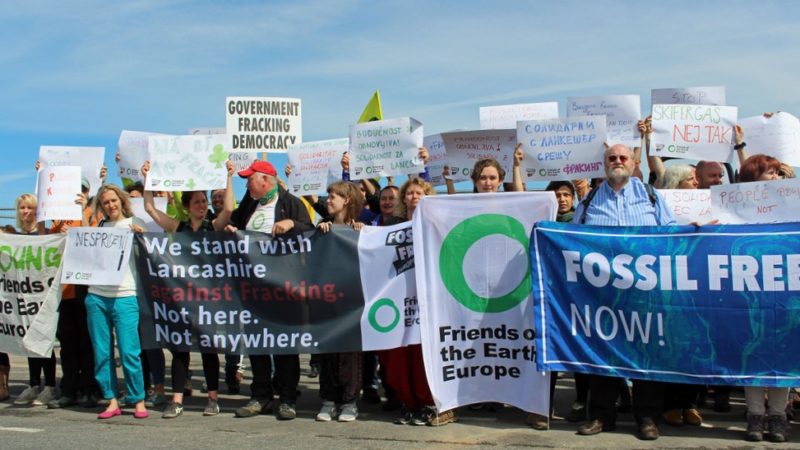The Tories are overriding objections to new dirty energy sources. But they will not win.

This week saw the first anniversary of ‘Green Mondays’ at the Preston New Road anti-fracking site. That’s a year where every Monday, members of the green movement – backed by the Green Party – have provided support for the ‘protectors’ who are on site 24 hours a day, seven days a week.
They’ve been monitoring what Cuadrilla are doing. And they’ve demonstrating the lack of public support for this dinosaur industry.
The toots of support from passing drivers are often so frequent that it is difficult to record a video on the site. That’s a demonstration of the reality around the country: the people are against fracking, and refusing to accept it, while the government is lined up with the frackers in an increasingly desperate and undemocratic drive to go ahead against the people’s wishes.
Again and again, councils, the representatives of their local community, have said “no” to fracking. Leading in this were Lancashire County Council, who despite tremendous pressure, said “no” to the sites at Preston New Road and Roseacre Wood. Westminster of course, just ignored that and overruled them on Preston New Road.
Derbyshire County Council said no at Marsh Lane. But this Thursday, after a long, expensive – and for Eckington Against Fracking, exhausting planning inquiry – on narrow grounds the objection was overruled.
That means the more than 100 local residents who I sat with at the start of that enquiry face noise comparable to “hanging a motorbike from a crane in a field near homes for three months…24 hours a day”.
This for an industry that clearly has no future in a world in which we have no choice but to slash our carbon emissions. The local Tory MP, Lee Rowley, elected on an anti-fracking platform in 2017 (his Labour opponent was explicitly pro-fracking) has been steadfast in his opposition.
Rotherham Council said “no” to fracking at Harthill, and again we had a long and draining inquiry by the planning inspector. Again, the democratic public will was overruled, despite the site being so unsuitable for this industrial development that there will have to be two sites where traffic controls will have to be in place to get the Ineos lorries through.
All of these inquiries have involved massive amounts of voluntary work from local residents. But as Deborah Gibson said at Harthill, “it is kind of involuntary work.” Of course people will stand up for their local communities, and the fragile, much-abused world in which we all live.
Those supporting the frackers, however, are virtually all paid consultants and lawyers. It must be costing the industry a mint – without return.
Anyone who’s feeling tired by the struggle can look to what it has achieved. Back in 2012, when fracking was proposed at Balcombe, the industry thought it would be operating by now. Instead, in more than six years, it has got not one molecule of fracked gas out of the ground.
The government is seeking to cut the cost, making exploratory drilling a ‘permitted development‘ and including fracking in the Nationally Significant Infrastructure Projects Regime.
As the Campaign to Protect Rural England has said: “If this goes ahead, it will be as easy to drill an exploration fracking well as it is to build a conservatory or erect a fence.” That organisation’s petition against the proposed changes is heading for 200,000 signatures.
But such a loss of local democratic control is clearly not the will of the people and has drawn massive opposition, including from a majority of Tory councillors. The mayor of Malton in North Yorkshire (where locals saw off a fracking attempt at Ryedale) has launched a judicial review against the plan.
Meanwhile, the government is trying to cover up the lack of public support for fracking. For four years the Public Attitudes Tracker survey on renewable energy and shale gas, published by the Department for Business, Energy & Industrial Strategy, has asked the public for their view on fracking. In the latest, they didn’t.
As The Times put it: “If you don’t like the answer, stop asking the question.”
But, as I said to the protectors at Preston New Road on Monday, I’m confident that I won’t need to go back for the second anniversary of Green Mondays there.
The current situation is unsustainable – economically and politically.
The people have said “no”. Even many Tory politicians are saying “no”.
Experts are questioning the health impacts of fracking. Local politicians are pointing out that regulation and oversight of the frackers is grossly inadequate.
The government and the companies are fighting a losing battle. Without public consent, this industry cannot go ahead – and the public will not consent to this abuse of our future.
Natalie Bennett is the former leader of the Green Party and writes regularly for Left Foot Forward.
To reach hundreds of thousands of new readers we need to grow our donor base substantially.
That's why in 2024, we are seeking to generate 150 additional regular donors to support Left Foot Forward's work.
We still need another 117 people to donate to hit the target. You can help. Donate today.



